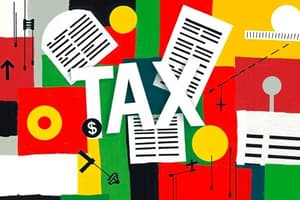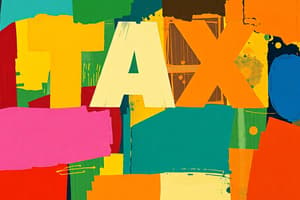Podcast
Questions and Answers
What is the primary purpose of taxes?
What is the primary purpose of taxes?
To finance government activities.
In what ways can taxes be levied?
In what ways can taxes be levied?
On worker's income, business profits, or on the cost of goods and services.
How do taxes differ from voluntary fees?
How do taxes differ from voluntary fees?
Taxes are involuntary and enforced by the government.
Who can be subject to taxation?
Who can be subject to taxation?
What role do government entities play in taxation?
What role do government entities play in taxation?
What is one major defect of the paper standard?
What is one major defect of the paper standard?
How does the paper standard contribute to inflation?
How does the paper standard contribute to inflation?
Why is inflation considered a problem for economic stability?
Why is inflation considered a problem for economic stability?
In what ways might the inflationary bias of the paper standard affect consumers?
In what ways might the inflationary bias of the paper standard affect consumers?
What might be an alternative to the paper standard to mitigate inflation?
What might be an alternative to the paper standard to mitigate inflation?
What is a proportional tax and how does it differ from a progressive tax?
What is a proportional tax and how does it differ from a progressive tax?
Explain the primary characteristic of a regressive tax and its impact on low income earners.
Explain the primary characteristic of a regressive tax and its impact on low income earners.
What defines a direct tax and how does it function in relation to taxpayers?
What defines a direct tax and how does it function in relation to taxpayers?
How do proportional and regressive taxes place different pressures on varying income levels?
How do proportional and regressive taxes place different pressures on varying income levels?
Identify a key advantage of progressive taxation for society.
Identify a key advantage of progressive taxation for society.
Why does paper money lack confidence among users?
Why does paper money lack confidence among users?
In what way does the durability of paper money compare to that of metallic coins?
In what way does the durability of paper money compare to that of metallic coins?
What specific factors contribute to the vulnerability of paper money?
What specific factors contribute to the vulnerability of paper money?
What implication does the lack of a gold reserve backing have on the perception of paper money?
What implication does the lack of a gold reserve backing have on the perception of paper money?
How does the lack of durability in paper money affect its practicality for everyday transactions?
How does the lack of durability in paper money affect its practicality for everyday transactions?
Why is stability an important characteristic of money?
Why is stability an important characteristic of money?
What is meant by divisibility in the context of money?
What is meant by divisibility in the context of money?
How does stability impact consumer confidence in a currency?
How does stability impact consumer confidence in a currency?
Give one example of how a lack of divisibility can hinder economic transactions.
Give one example of how a lack of divisibility can hinder economic transactions.
What challenges arise from a money system that lacks stability?
What challenges arise from a money system that lacks stability?
What is meant by the term 'store of value'?
What is meant by the term 'store of value'?
How does a store of value differ from perishable commodities?
How does a store of value differ from perishable commodities?
Why is it beneficial for an asset to function as a store of value?
Why is it beneficial for an asset to function as a store of value?
Can all assets act as a store of value? Why or why not?
Can all assets act as a store of value? Why or why not?
Give an example of an asset that serves as a store of value.
Give an example of an asset that serves as a store of value.
Flashcards
Definition of Tax
Definition of Tax
A compulsory payment to the government, often levied on income, business profits, or goods/services.
Tax Source
Tax Source
Taxes can be from workers' income, business profits, or added costs to specific goods or services.
Tax Enforcement
Tax Enforcement
Taxes are required payments enforced by governmental entities.
Involuntary Payment
Involuntary Payment
Signup and view all the flashcards
Tax Purpose
Tax Purpose
Signup and view all the flashcards
Proportional Tax
Proportional Tax
Signup and view all the flashcards
Progressive Tax
Progressive Tax
Signup and view all the flashcards
Regressive Tax
Regressive Tax
Signup and view all the flashcards
Direct Tax
Direct Tax
Signup and view all the flashcards
Tax Classification
Tax Classification
Signup and view all the flashcards
Stability in money
Stability in money
Signup and view all the flashcards
Divisible money
Divisible money
Signup and view all the flashcards
Money denominations
Money denominations
Signup and view all the flashcards
Short-term price fluctuations
Short-term price fluctuations
Signup and view all the flashcards
Units of value
Units of value
Signup and view all the flashcards
Paper Standard's Inflationary Bias
Paper Standard's Inflationary Bias
Signup and view all the flashcards
Inflationary Bias
Inflationary Bias
Signup and view all the flashcards
Paper Standard Defect
Paper Standard Defect
Signup and view all the flashcards
Monetary Inflation
Monetary Inflation
Signup and view all the flashcards
Paper Currency
Paper Currency
Signup and view all the flashcards
Store of Value
Store of Value
Signup and view all the flashcards
Perishable Goods
Perishable Goods
Signup and view all the flashcards
Commodity
Commodity
Signup and view all the flashcards
Value Retention
Value Retention
Signup and view all the flashcards
Future Use
Future Use
Signup and view all the flashcards
Paper Money Drawbacks
Paper Money Drawbacks
Signup and view all the flashcards
Lack of confidence
Lack of confidence
Signup and view all the flashcards
Durability Issues
Durability Issues
Signup and view all the flashcards
Gold Standard
Gold Standard
Signup and view all the flashcards
Coin Durability
Coin Durability
Signup and view all the flashcards
Study Notes
TAXATION
- Tax is the main source of government revenue.
- It's a compulsory contribution to state revenue.
- Taxes are levied on workers' income, business profits, or added to the cost of goods, services, and transactions
- Taxes are used to finance government activities.
- Taxes fund public works and services, and maintain infrastructure.
SYSTEM OF TAXATION
- Effective tax systems have different criteria
- Taxes should produce sufficient revenue.
- Tax laws should be clear and understandable for both taxpayers and collectors.
- Tax collection should be efficient and convenient.
- Taxes should be fair and impartial.
PRINCIPLES OF TAXATION
- Benefit principle: those who benefit most from government services should pay more in taxes.
- Ability-to-pay principle: people should pay taxes based on their ability to pay, irrespective of the benefit they receive.
CLASSIFICATION OF TAXES
- According to rate of increase:
- Proportional tax: same percentage rate for all income levels.
- Progressive tax: higher percentage rate for higher incomes.
- Regressive tax: higher percentage rate for lower incomes.
- According to payment:
- Direct tax: payable by the person directly taxed (e.g., income tax).
- Indirect tax: imposed on the value of products/services, and are often passed on to consumers (e.g., value-added tax).
- According to purpose:
- Capital gains tax: on gains from asset sales.
- Documentary stamp tax: on documents related to obligations, rights, or property.
- Income tax: on annual profits from property or professions.
- Estate tax: on the right of a deceased person to transmit assets to heirs
- Percentage tax: on sales or leases of goods, services or properties; gross annual sales not exceeding 550,000.
- Value-added tax (VAT): on goods, services and real property transfer
- Excise tax: on production, sale, and consumption of certain goods.
- Withholding tax: on income payments, to ensure tax collection.
OTHER SOURCES OF GOVERNMENT FUNDS
- Income from government-owned and controlled corporations (GOCCs)
- Income from the sale of government-owned capital
- Grants-in-aid from local governments
- Income from the Philippine Amusement and Gaming Corporation (PAGCOR)
EVOLUTION OF PHILIPPINE MONEY
- The first coins in the Philippines were discovered, and were used in barter systems.
- The Spanish introduced coins that bore the image of Queen Isabella.
- The first paper money was issued by El Banco Español-Filipino de Isabella II, called "Peso Fuertes"
MONETARY STANDARDS
- Commodity standard: money's value is based on the value of a commodity (e.g., gold or silver).
- Gold standard: monetary value tied to gold.
- Silver standard: monetary value tied to silver.
- Non-commodity standard: money's value is backed by the government's promise.
- Paper standard: using paper currency as money.
FORMS OF MONEY
- Commodity money: objects with intrinsic value used for exchange (e.g., gold, silver, cattle).
- Fiat money: money's value is based on government decree; it has no intrinsic value (e.g., paper money).
- Credit money: instruments or promises to pay money (e.g., checks, credit cards).
- Plastic money: electronic forms of payment (e.g., debit cards, credit cards, mobile payment).
CHARACTERISTICS OF MONEY
- Durability: withstands physical wear.
- Portability: easy to move and carry.
- Divisibility: divided into smaller units.
- Uniformity: all units are the same.
- Acceptability: accepted by most people as a medium of exchange.
- Stability: relatively stable value over time.
MERITS OF THE PAPER STANDARD
- Economical: cheaper than gold or silver.
- Elastic: government can adjust money supply easily.
DEMERITS OF THE PAPER STANDARD
- Inflationary bias: potential for excessive money printing.
- Exchange instability: fluctuations in exchange rates.
Studying That Suits You
Use AI to generate personalized quizzes and flashcards to suit your learning preferences.




